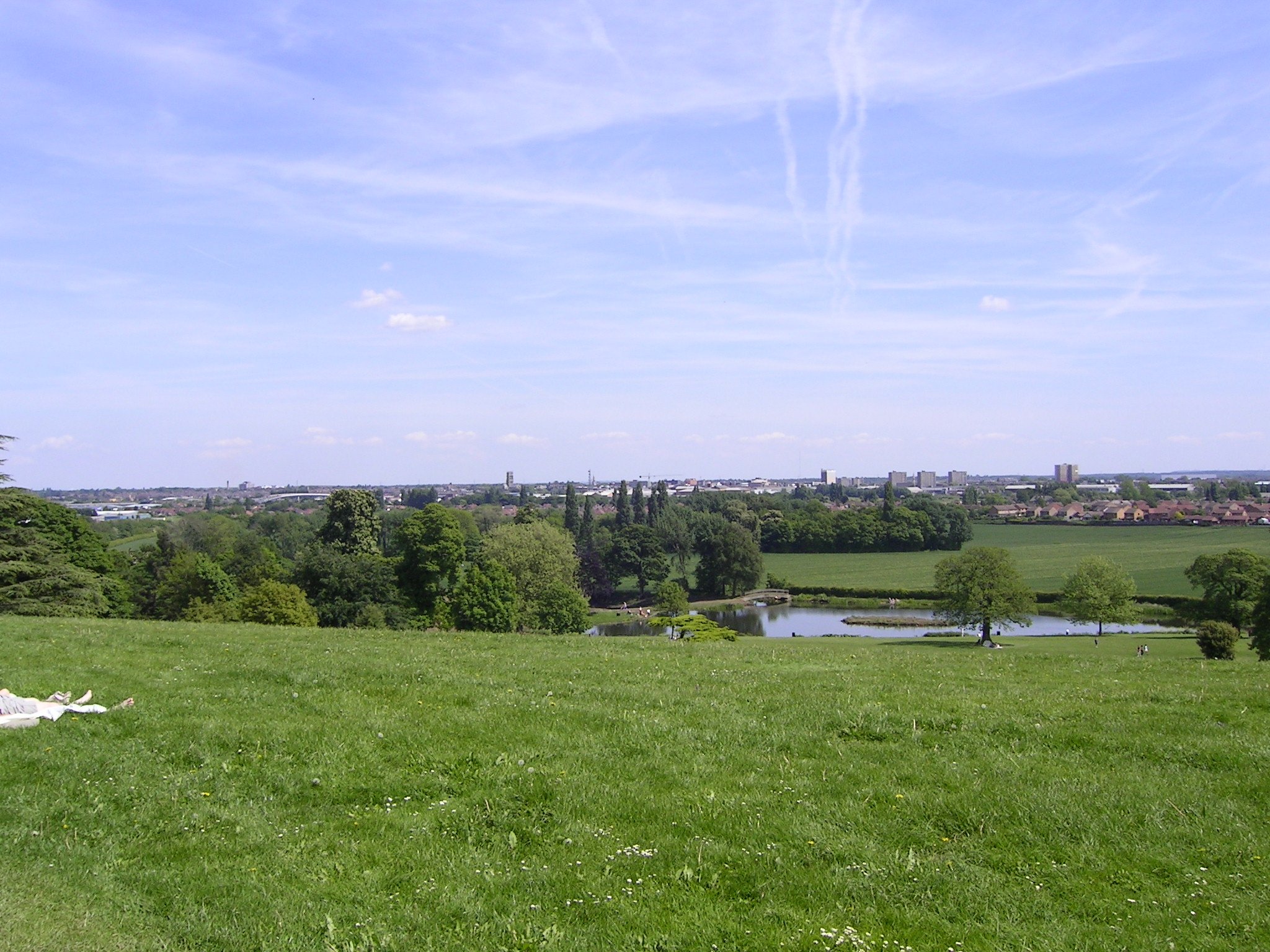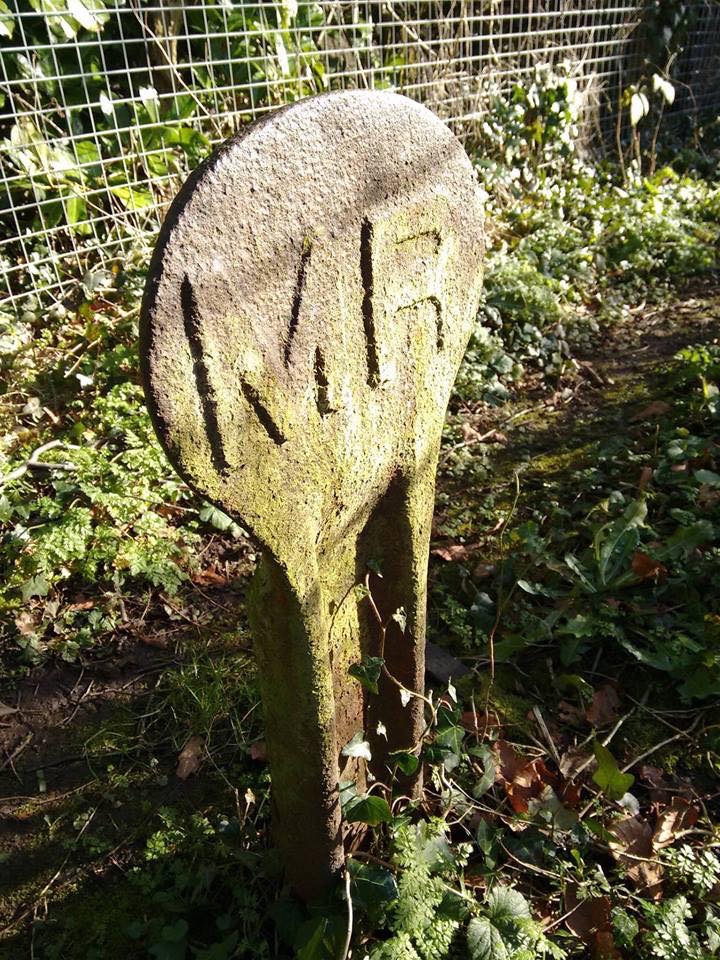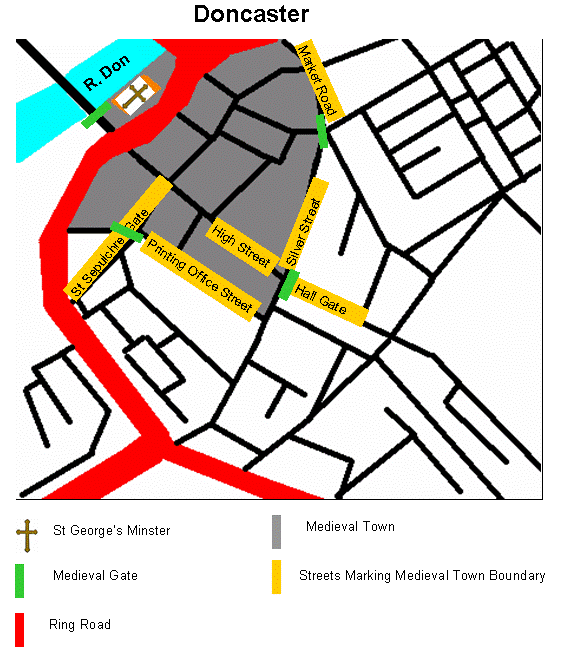|
Doncaster (Cherry Tree Lane) Railway Station
Doncaster (Cherry Tree Lane) railway station was situated in the Hexthorpe district of Doncaster, South Yorkshire, England and was the original terminus of the South Yorkshire Railway. The station, later to be known simply as "Cherrytree", was used for the first time when a special train, for the inspection of the line to Swinton where it joined the Midland Railway, ran on 29 October 1849 and it was scheduled to open for public use on 3 November of the same year, however this was not to be as some work required to be completed. The actual public opening took place on 10 November. The station was closed when running powers were agreed between the South Yorkshire Railway and the Great Northern Railway which allowed the SYR to run their passenger trains into the GNR station. In order to accommodate excursion traffic an island platform station known as St. James' Bridge was built on a site between Cherrytree and the GNR station by the LNER LNER may refer to: * London and North E ... [...More Info...] [...Related Items...] OR: [Wikipedia] [Google] [Baidu] |
Hexthorpe
Hexthorpe is a suburb of Doncaster, South Yorkshire, England. Historically part of the West Riding of Yorkshire, the area's shape resembles a rhombus, with borders with Balby and Doncaster town centre, separated by railway lines and the river separating the area from the villages of Sprotbrough and Newton. The Hexthorpe House was a well known pub in the area. Following a fire, the pub remained derelict for a few months and the remains were demolished in 2009. The old pub sign was saved and has now been erected in Hexthorpe Flatts Park. Education Schooling of four to eleven-year-old children is provided in the local area by Hexthorpe Primary School, which also offers a nursery for pre-school-aged children. The school is listed by Ofsted as one of the highest achieving schools in the borough. Children living in Hexthorpe, who are of secondary school age, fall within the catchment areas for Hall Cross Academy, Astrea Academy Woodfields and Doncaster College. There are two in ... [...More Info...] [...Related Items...] OR: [Wikipedia] [Google] [Baidu] |
Metropolitan Borough Of Doncaster
The City of Doncaster is a metropolitan borough with city status in South Yorkshire, England. It is named after its principal settlement, Doncaster, and includes the surrounding suburbs of Doncaster as well as numerous towns and villages. The district has large amounts of countryside. At 219 sq miles, it is the largest metropolitan borough by area in England. The largest settlement in the borough are Doncaster itself, followed by the towns of Thorne, Hatfield and Mexborough (the latter of which is part of the Barnsley/Dearne Valley built-up area), and it additionally covers the towns of Conisbrough, Stainforth, Bawtry, Askern, Edlington and Tickhill. Doncaster borders the Selby district of North Yorkshire to the north, the East Riding of Yorkshire to the north-east, North Lincolnshire to the east, Bassetlaw in Nottinghamshire to the south-east, Rotherham to the south-west, Barnsley to the west, and Wakefield, West Yorkshire, to the north-west. It is part of the Yorkshire ... [...More Info...] [...Related Items...] OR: [Wikipedia] [Google] [Baidu] |
Ordnance Survey National Grid
The Ordnance Survey National Grid reference system (OSGB) (also known as British National Grid (BNG)) is a system of geographic grid references used in Great Britain, distinct from latitude and longitude. The Ordnance Survey (OS) devised the national grid reference system, and it is heavily used in their survey data, and in maps based on those surveys, whether published by the Ordnance Survey or by commercial map producers. Grid references are also commonly quoted in other publications and data sources, such as guide books and government planning documents. A number of different systems exist that can provide grid references for locations within the British Isles: this article describes the system created solely for Great Britain and its outlying islands (including the Isle of Man); the Irish grid reference system was a similar system created by the Ordnance Survey of Ireland and the Ordnance Survey of Northern Ireland for the island of Ireland. The Universal Transverse Merca ... [...More Info...] [...Related Items...] OR: [Wikipedia] [Google] [Baidu] |
South Yorkshire Railway
The South Yorkshire Railway was a railway company with lines in the West Riding of Yorkshire, England. Initially promoted as the South Yorkshire Coal Railway in 1845, the railway was enabled by an act of 1847 as the South Yorkshire Doncaster and Goole Railway Company which incorporated into it the permitted line of the Sheffield, Rotherham, Barnsley, Wakefield, Huddersfield and Goole Railway south of Barnsley, the River Dun Navigation, and Dearne and Dove Canals; and had permission for a line from Swinton to Doncaster and other branches. On 10 November 1849 the first section of line opened between Swinton and Doncaster, with the remainder opening in the early 1850s. In 1850 the company formally amalgamated with its canal interests, forming the South Yorkshire Railway and River Dun Company, in context generally referred to as the "South Yorkshire Railway". As well as extensive colliery traffic, the company's tracks eventually supported a passenger service between Barnsley and D ... [...More Info...] [...Related Items...] OR: [Wikipedia] [Google] [Baidu] |
Doncaster
Doncaster (, ) is a city in South Yorkshire, England. Named after the River Don, it is the administrative centre of the larger City of Doncaster. It is the second largest settlement in South Yorkshire after Sheffield. Doncaster is situated in the Don Valley on the western edge of the Humberhead Levels and east of the Pennines. At the 2021 census, the city had a population of 308,100, while its built-up area had a population of 158,141 at the 2011 census. Sheffield lies south-west, Leeds north-west, York to the north, Hull north-east, and Lincoln south-east. Doncaster's suburbs include Armthorpe, Bessacarr and Sprotbrough. The towns of Bawtry, Mexborough, Conisbrough, Hatfield and Stainforth, among others, are only a short distance away within the metropolitan borough. The towns of Epworth and Haxey are a short distance to the east in Lincolnshire, and directly south is the town of Harworth Bircotes in Nottinghamshire. Also, within the city's vicinity are Barnsley, ... [...More Info...] [...Related Items...] OR: [Wikipedia] [Google] [Baidu] |
South Yorkshire
South Yorkshire is a ceremonial and metropolitan county in the Yorkshire and Humber Region of England. The county has four council areas which are the cities of Doncaster and Sheffield as well as the boroughs of Barnsley and Rotherham. In Northern England, it is on the east side of the Pennines. Part of the Peak District national park is in the county. The River Don flows through most of the county, which is landlocked. The county had a population of 1.34 million in 2011. Sheffield largest urban centre in the county, it is the south west of the county. The built-up area around Sheffield and Rotherham, with over half the county's population living within it, is the tenth most populous in the United Kingdom. The majority of the county was formerly governed as part of the county of Yorkshire, the former county remains as a cultural region. The county was created on 1 April 1974, under the Local Government Act 1972. It was created from 32 local government districts of the ... [...More Info...] [...Related Items...] OR: [Wikipedia] [Google] [Baidu] |
England
England is a country that is part of the United Kingdom. It shares land borders with Wales to its west and Scotland to its north. The Irish Sea lies northwest and the Celtic Sea to the southwest. It is separated from continental Europe by the North Sea to the east and the English Channel to the south. The country covers five-eighths of the island of Great Britain, which lies in the North Atlantic, and includes over 100 smaller islands, such as the Isles of Scilly and the Isle of Wight. The area now called England was first inhabited by modern humans during the Upper Paleolithic period, but takes its name from the Angles, a Germanic tribe deriving its name from the Anglia peninsula, who settled during the 5th and 6th centuries. England became a unified state in the 10th century and has had a significant cultural and legal impact on the wider world since the Age of Discovery, which began during the 15th century. The English language, the Anglican Church, and Engli ... [...More Info...] [...Related Items...] OR: [Wikipedia] [Google] [Baidu] |
Midland Railway
The Midland Railway (MR) was a railway company in the United Kingdom from 1844. The Midland was one of the largest railway companies in Britain in the early 20th century, and the largest employer in Derby, where it had its headquarters. It amalgamated with several other railways to create the London, Midland and Scottish Railway at grouping in 1922. The Midland had a large network of lines emanating from Derby, stretching to London St Pancras, Manchester, Carlisle, Birmingham, and the South West. It expanded as much through acquisitions as by building its own lines. It also operated ships from Heysham in Lancashire to Douglas and Belfast. A large amount of the Midland's infrastructure remains in use and visible, such as the Midland main line and the Settle–Carlisle line, and some of its railway hotels still bear the name '' Midland Hotel''. History Origins The Midland Railway originated from 1832 in Leicestershire / Nottinghamshire, with the purpose of serving the needs o ... [...More Info...] [...Related Items...] OR: [Wikipedia] [Google] [Baidu] |
Island Platform
An island platform (also center platform, centre platform) is a station layout arrangement where a single platform is positioned between two tracks within a railway station, tram stop or transitway interchange. Island platforms are popular on twin-track routes due to pragmatic and cost reasons. They are also useful within larger stations where local and express services for the same direction of travel can be provided from opposite sides of the same platform thereby simplifying transfers between the two tracks. An alternative arrangement is to position side platforms on either side of the tracks. The historical use of island platforms depends greatly upon the location. In the United Kingdom the use of island platforms is relatively common when the railway line is in a cutting or raised on an embankment, as this makes it easier to provide access to the platform without walking across the tracks. Advantages and tradeoffs Island platforms are necessary for any station with many th ... [...More Info...] [...Related Items...] OR: [Wikipedia] [Google] [Baidu] |
Doncaster (St
Doncaster ( ) is a city in South Yorkshire, England. Named after the River Don, it is the administrative centre of the larger City of Doncaster. The city is the second largest settlement in South Yorkshire after Sheffield. It is situated in the Don Valley on the western edge of the Humberhead Levels and east of the Pennines. The urban subdivision had a population of 113,566 at the 2021 census, whilst the City of Doncaster metropolitan borough had a population of 308,106. The city's suburbs include Armthorpe, Bessacarr, Sprotbrough among others. The towns of Epworth and Haxey are a short distance to the east in Lincolnshire, and directly south is Harworth Bircotes in Nottinghamshire. Also, within the city's vicinity are Barnsley, Wakefield, Pontefract, Selby, Goole, Scunthorpe, Gainsborough, Retford, Worksop and Rotherham, to which Doncaster is linked by road and rail. As part of the Platinum Jubilee Civic Honours, Doncaster received city status by Letters Patent. A ceremony ... [...More Info...] [...Related Items...] OR: [Wikipedia] [Google] [Baidu] |
London And North Eastern Railway
The London and North Eastern Railway (LNER) was the second largest (after LMS) of the " Big Four" railway companies created by the Railways Act 1921 in Britain. It operated from 1 January 1923 until nationalisation on 1 January 1948. At that time, it was divided into the new British Railways' Eastern Region, North Eastern Region, and partially the Scottish Region. History The company was the second largest created by the Railways Act 1921. The principal constituents of the LNER were: * Great Eastern Railway * Great Central Railway * Great Northern Railway * Great North of Scotland Railway * Hull and Barnsley Railway * North British Railway * North Eastern Railway The total route mileage was . The North Eastern Railway had the largest route mileage of , whilst the Hull and Barnsley Railway was . It covered the area north and east of London. It included the East Coast Main Line from London to Edinburgh via York and Newcastle upon Tyne and the routes from Edinburgh to ... [...More Info...] [...Related Items...] OR: [Wikipedia] [Google] [Baidu] |






